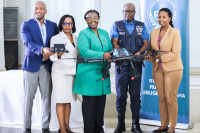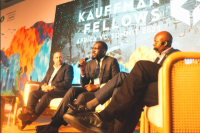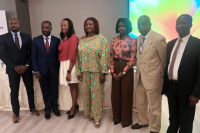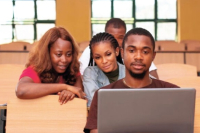
News (1796)
Information and communication technologies have become key drivers for efficiency and growth in several economic sectors. Realizing the importance of such technologies, Cameroon is stepping up initiatives in the digital sector. The government recently launched a major project to rapidly develop the sector.
On Friday, September 15, Cameroon’s State Minister Ferdinand Ngoh Ngoh granted an audience to a delegation of Chinese tech giant Huawei. According to local media, during the audience, the two parties discussed a range of topics, including the development of the digital sector in Cameroon.
"Given Cameroon's potential, Huawei Group officials reaffirmed their commitment to working alongside the country to develop a high-level national strategy for the digital economy, to make Cameroon an ICT hub in the French-speaking African region," reports the state-owned daily Cameroon Tribune.
The technology group's visit to Cameroon comes a month after the launch of the Project for the Acceleration of Digital Transformation in Cameroon (PATNUC). The project, financed to the tune of $100 million by the World Bank, is designed to accelerate the country's digital transformation through three main complementary components on the supply and demand sides of the digital economy, with a particular focus on digitizing the agricultural sector.
Thanks to this mutual commitment, Cameroon will be able to benefit from Huawei's technological advances and expertise to strengthen its digital sector and foster economic development. The two parties will also be working together to transfer ICT technology to Cameroon's youth, as well as promote rural electrification using solar energy and develop the concept of smart cities using video surveillance at the national level.
Samira Njoya
For the first cohort, Investing in Innovation selected 31 startups. This time, it has selected 29 startups operating in healthcare technologies, particularly in healthcare supply chains.
Last Tuesday, the pan-African initiative Investing in Innovation (i3) announced the second cohort of its i3 program. The cohort comprises 29 startups from ten African countries. The startups will take part in the annual market access event in Nairobi from November 14 to 15, 2023.
"Selected startups receive introductions to leading potential customers in industry, donor agencies and governments, a $50,000 grant, and tailored investment readiness support from leading accelerators Villgro Africa, IMPACT Lab, Startupbootcamp Afritech, and CcHUB," we learn.
For the startups selected for this second cohort, 38% are headed by women, and 17% are active in French-speaking Africa, a region that is "less attractive" to foreign investors. Against a backdrop of slowing startup fundraising in Africa, these various programs show that the African technology sector is still attractive.
According to Kieran Daly, Director of Global Health Agencies and Funds at the Bill & Melinda Gates Foundation, the program, supported by the Bill & Melinda Gates Foundation and sponsored by the likes of Cencora and Microsoft, complements state and international initiatives to improve health outcomes and strengthen local health systems. “Programs like i3 help us understand, support, and engage with technology-driven solutions emerging across Africa, hand-in-hand with our partners,” he added.
Adoni Conrad Quenum
Tourism is a key economic sector in Namibia. At a time when the government is struggling to showcase the country’s attractions, digital solutions could contribute to the effective implementation of ongoing projects.
LEFA Transportation Services, a Namibian e-mobility solution that connects drivers and passengers via its digital platform, announced on Monday, September 18 a partnership with Google Maps, the global online mapping service developed by Google.
The partnership aims to showcase Namibia's vast expanses on Google Street View, a virtual navigation service that complements Google Maps and Google Earth by enabling 360° panorama views.
"By making the nation’s natural wonders, historic sites, and urban landscapes accessible with the click of a button, potential tourists can be enticed to experience the beauty of Namibia first-hand," said Melkies Ausiku, founder and general manager of LEFA Transportation Services.
As part of this ambitious 17,000 km project, Google Maps will carry out a major update on Namibia. Eventually, locals and visitors alike will discover greater precision in the names of the streets and newly mapped roads.
According to Melkies Ausiku, the project will provide an authentic and comprehensive digital representation of Namibia. The digital representation will thus serve as an innovative marketing tool, opening up opportunities for businesses to attract a global customer base. Local businesses, from charming accommodations to restaurants, cultural sites, and tour operators, will benefit from unrivaled visibility.
Samira Njoya
In Africa, governments are gradually adopting tech solutions to address document fraud, identity theft, terrorism, and cybercrime as well as upgrade to international standards.
The Federal Republic of Somalia will start issuing biometric identity cards to its citizens. On Sunday, September 17, on the sidelines of a conference organized in Mogadishu by the National Identification and Registration Authority (NIRA), Prime Minister Hamza Abdi Barre inaugurated the Somali National Identification System (SNIDS).
Designed with the help of a multi-million dollar grant from Pakistan, the new system aims to provide Somalis with a secure and universally recognized form of identification.
The SNIDS digital solution was developed by NIRA in partnership with NADRA, Pakistan's National Database and Registration Authority. It is the result of a partnership signed by the two institutions in 2017. It aims to issue identity cards to at least 15 million Somalis, including children, by 2026. It is in line with "ID4Africa", a movement that aims to provide all Africans with a digital identity by 2030.
The system will assign a unique identification number (NIU) based on demographic and biometric data to any individual of Somali nationality or resident in Somalia. According to the Prime Minister, this identity number will serve as an identification document for each individual until his or her death. This data, together with the NIU, will make it possible to set up a central, secure, and reliable database that will serve as a reference for verifying the identity of beneficiaries of public, private, or social services.
"NADRA takes immense pride in the successful execution and launch of Somalia's National Identification System. This achievement reinforces Pakistan’s vision for a more secure and prosperous Somalia, where every citizen has access to reliable identification. The National ID System will not only bolster security but also pave the way for inclusive development, financial empowerment, and improved governance," said NADRA Chairman Asad Rehman Gilani.
Samira Njoya
After convincing ByteDance, TikTok's parent company, to open a regional office in Kenya, President William Ruto wants to convince other global tech giants to do the same.
On Friday, September 15, William Ruto (photo, left) met with the heads of several American multinational technology companies in San Francisco. The aim is to convince these firms to invest in Africa, particularly in his country, Kenya.
"Kenya is your gateway to the Silicon Savannah [Kenya's technology ecosystem created as a local version of the U.S. Silicon Valley], to the East African Community, the most integrated regional market of 500 million, and a Pan-African market of 1.4 billion. If you build it in Kenya, it works for Africa, and if you set it up in Kenya, your African footprint is guaranteed," the Kenyan president said.
Kenya, Egypt, South Africa, and Nigeria are the countries attracting the most investment in Africa's technology sector. On a continental scale, Kenya is a mature ecosystem, and the executive is doing what's necessary to attract more capital and investors. In August 2023, after a virtual meeting with President Ruto, Chinese giant Bytedance’s executives decided to open offices in the country.
“Kenya is a full package investment destination; economically stable, entrepreneurial, secure, innovative with a favorable tax environment, skilled labor force, technological expertise, green energy credentials and a gateway for six undersea fiber-optic cables providing reliable data connectivity,” the president told investors in Silicon Valley.
Several executives and/or representatives of the technology firms present at the meeting were won over by the President's speech. Apple Chairman and CEO Tim Cook is reportedly considering the creation of a developer academy and also plans to exploit the potential of the country's green data centers. Google wants to invest several million dollars to strengthen its digital training and innovation initiatives on the continent. As for Visa, the fintech company has already chosen Kenya as the location for its global digital innovation studio.
Adoni Conrad Quenum
Over the past few years, digital adoption and digitization have grown steadily across Africa. Well aware of the importance of that digital sector for the development of several sectors, Morocco is stepping up efforts to fully capitalize on the opportunities offered.
On Friday, September 15 in Rabat, the Moroccan Ministry of Digital Transition and Administrative Reform (MTNRA) and the German International Development Cooperation Agency (GIZ) signed two partnership agreements. The agreements aim to promote digital transformation of the public administration and the digital inclusion of very small and medium-sized enterprises (VSEs) and small and medium-sized enterprises (SMEs) in Morocco.
The first agreement, worth 3 million euros, will run for 3 years. It aims to support public agencies and institutions in their efforts to modernize services offered to citizens.
The second partnership, valued at 5 million euros, is dedicated to enhancing the technical and organizational capabilities of institutional stakeholders committed to promoting digital inclusion among SMEs. This initiative will oversee the development of mechanisms designed to lower transaction costs for service providers, ensuring the seamless digitization of SMEs and bolstering their capacity to leverage tailored services for their digital transformation. This agreement will be in effect for 4 years.
The new agreements complement several others recently signed with major national and international tech companies to promote the digital sector in Morocco. They are in line with Maroc Digital 2020– Now Maroc Digital 2025– that sets digital transformation of the public administration as one of its key focuses.
According to Ghita Mezzour (photo, center), the Minister Delegate in charge of Digital Transition and Administrative Reform, modernizing the administration is one of the Ministry's biggest projects, as it strives to increase efficiency and performance, and make administrative procedures and processes more transparent and accessible, in line with directives of the King of Morrocco.
For years now, drones have proven their worth in many fields. By providing aerial views of a given area, they give the ability to capture data that was previously inaccessible, making their use more important than ever.
Last Friday, the Rwanda Investigation Bureau (RIB) and the Ministry of the Environment jointly launched the use of drones to combat environmental crimes in the country.
The first drone, dubbed "Inganji I", will monitor, detect, and collect evidence that will be used to prosecute those engaged in activities that degrade the environment.
"The drones will help to respond to and control activities that damage our environment including land degradation, water pollution, and illegal logging in protected areas," said Environment Minister Jeanne d'Arc Mujawamariya (photo, center). According to the government official, who cited a recent report, illegal mining, community encroachment into protected areas and water pollution are the most environmentally degrading activities in the country.
The launch of this first drone is part of a long-term green growth and climate resilience strategy and an ambitious climate action plan set up a few years ago by the Rwandan government. The aim is to reduce carbon emissions by 38% by 2030 and achieve carbon neutrality by 2050.
The use of drones will thus play a crucial role in achieving these objectives. Among other things, it will help environmental inspectors carry out their tasks, collect information in prohibited areas, and provide accurate data.
Samira Njoya
In addition to strengthening its presence in the region, the investment will enable the Nigerian company to provide secure and transparent payment services to consumers and businesses in Kenya.
Nigerian payment solutions provider Flutterwave recently announced plans to invest $50 million in Kenya. Olugbenga Agboola (photo, center), CEO and co-founder of Flutterwave revealed this during a media interview in the country's capital, Nairobi.
According to the CEO, the investment will be deployed as soon as the company receives regulatory approval from the Central Bank of Kenya (CBK).
"We are very optimistic about Kenya and once we get the license, our team in the country is ready to deploy the very next day. [...] We are happy we are going through the process of approval. We didn’t chicken out. We stayed the course even when everything stopped. The current administration is very supportive," he said.
Flutterwave's announcement comes a week after the company signed a partnership agreement with Indian financial institution IndusInd Bank to expand its services to India.
As far as Kenya is concerned, Flutterwave announced last April that it would be setting up its main operating station in Nairobi, for the East African market. This investment will be used to hire staff and develop Flutterwave's infrastructure in Kenya. Olugbenga Agboola also noted that the company already has more than two dozen employees in Kenya.
Founded in 2016 by Nigerians Olugbenga Agboola and Iyinoluwa Aboyeji, Flutterwave is now present in some 30 African countries. The Lagos and San Francisco-based startup is valued at around $3 billion.
Samira Njoya
With an Internet penetration rate of 33.63% in 2021, Liberia is gearing up to accelerate its digital transformation. To achieve this, the country needs strong allies it can count on.
At a workshop held on Tuesday, September 12 under the theme "Building a Digital Liberia- Bridging Vision and Transformation for Unleashing Future Development," the World Bank announced that it will support Liberia's digitization efforts to drive meaningful growth and development.
The UN organization will harness the power of technology to drive innovation, improve governance, and create economic opportunities for all Liberians, says Georgia Wallen, World Bank Country Director for Liberia.
"We’ll assess Liberia’s digital transformation journey and also look ahead — what can Liberia’s digital transformation economy look like in the future? [...] So, this is not only about adopting technology that is sustainable and benefits all but rather creating an entirely digital environment that is inclusive," she added.
The country is lagging in the digital transformation process compared to other African countries. However, it intends to catch up in this sector. According to data from the International Telecommunication Union, the country's Internet penetration rate is steadily rising. From 18.9% in 2018, it reached 33.63% in 2021.
For Worlea Saywah Dunah, Liberia's Minister of Posts and Telecommunications, the workshop is in line with the government’s strategy to transform the Liberian economy and enhance social development.
Social and economic development are the visions “ we aspired to as a nation in developing a vibrant ICT sector and this vision is captured in the President’s flagship agenda, which is called the PAPD. We are beginning to work with stakeholders in the sector and development partners to develop a 5-year national digital transformational agenda that will meet the best ICT standards through which we can achieve social and economic development as enshrined in the PAPD,” he said
Adoni Conrad Quenum
The adoption of technology across the continent presents numerous opportunities. Yet, realizing these opportunities hinges on equipping young people with digital skills. Many governments are creating opportunities to train their youth in this sector for development.
Kenya's ICT Authority has launched a program to promote digital skills among underrepresented groups. The program was announced in a tweet by the ICT Authority on September 12.
The initiative, the Presidential Digital Talent Program (PDTP), aims to equip 400 young Kenyans, including women, persons with disabilities, and those in Arid and Semi-Arid Lands (ASAL), with essential ICT skills.
The PDTP offers comprehensive training in network and infrastructure, software development, artificial intelligence (AI), graphic design, digital marketing, and data analysis.
The goal is to empower marginalized groups with digital skills for employment and entrepreneurship. By targeting ASAL regions, the program seeks to bridge the digital divide and ensure remote communities benefit from ICT.
Stanley Kamanguya, CEO of the ICT Authority, stressed the government's commitment to developing a skilled ICT workforce through PDTP. Digital skills play a vital role in leveraging technology across all sectors of the economy.
PDTP's comprehensive training is expected to boost Kenya's economy by diversifying the workforce. This will enable both the government and the private sector to tap into a talent pool driving innovation.
The program, set to run for 12 months, will provide participants with the expertise to thrive in the digital age. Kenya aims to become a regional hub for digital talent and innovation, fostering economic growth and inclusivity.
Kenyan nationals can apply at digitalent.go.ke until October 3, 2023.
Hikmatu Bilali
More...
As the world continues to see advancements in the use of digital tools for development and growth, African countries are not left behind. Many African governments aim to leverage collaborations with other countries to fast-track their adoption of technology, and development subsequently.
Yesterday September 13, 2023, India’s Union Cabinet approved a Memorandum of Understanding (MoU) the country signed with Sierra Leone to advance digital transformation initiatives and bilateral cooperation.
Signed on June 12, 2023, the memorandum will see a collaboration between India's Ministry of Electronics and Information Technology and Sierra Leone's Ministry of Information and Communications. It focuses on sharing successful Digital Solutions implemented at a population scale.
Key objectives of the MoU include promoting closer cooperation, exchanging experiences, and sharing digital technology-based solutions to drive digital transformation in both countries. The partnership is also expected to create employment opportunities in the IT sector.
Effective from the date of signature, the MoU will remain in force for three years. It aims to enhance cooperation in both Government-to-Government (G2G) and Business-to-Business (B2B) domains, particularly in Digital Public Infrastructure (DPI).
The MoU signing marks a significant step toward digital empowerment and cooperation between India and Sierra Leone, promising positive transformation in both nations' digital landscapes. Activities implemented under its framework will be funded by regular operating allocations from both administrations, underscoring their commitment to the collaboration.
Hikmatu Bilali
Tanzania aims to become one of the leaders in the digital sector in Africa. To achieve this goal, the executive is focused on building a strong digital infrastructure.
The Tanzanian government is currently working on the implementation of several citizen-centric digital infrastructures, including the construction of a National Enterprise Services Bus (NESB), a GovTech Innovation Center, and a National Services Directory.
The projects were announced by the Minister of Information, Communication, and Information Technology, Nape Nnauye (photo), at the end of the "Connect-to-Connect 2023" summit held from Saturday, September 9 to Sunday, September 10 in Zanzibar.
In his concluding address, the Minister specified that the National Enterprise Services Bus will facilitate the transparent sharing of data between public and private sector companies. The creation of the GovTech Innovation Centre and the Tanzanian Services Directory is a crucial step in improving the dissemination of information services for government and private entities.
The said initiatives are part of the "Revised National ICT Policy 2023", which aims to create a sound policy environment to narrow the smart device penetration gap in the country and drive digital transformation.
The revised policy “seeks to strengthen the research and innovation ecosystem, encouraging individuals and innovators to generate creative solutions for addressing pressing social issues and also prioritizes cyber security and the development of future-ready ICT human resources in the country,” explained Minister Nape Nnauye.
Tanzania recently multiplied partnerships with other countries and international companies to accelerate the digital transformation of its economy. The government also announced several investments in the Zanzibar Archipelago aimed at making the island a technological innovation hub par excellence in Africa.
According to the Minister of ICT, these initiatives have enabled Tanzania to rank among the top digital performers in Africa. Among other things, the country ranks 23rd worldwide on the World Bank's GovTech 2022 Maturity Index (GTMI).
Samira Njoya
Apart from science and technology, engineering is one of the most important sectors of the Nigerian economy. It is therefore important for professionals in the sector to digitize their activities to capitalize on the digital opportunities.
The Nigerian Society of Engineers (NSE), the umbrella organization of engineering professionals in Nigeria, inaugurated its Innovation Center in Abuja on Wednesday, September 13.
According to its executives, the new center will serve as a sanctuary for engineers and professionals to collaborate and innovate, and offer training and resources to facilitate the adoption of digital technologies by businesses and organizations.
According to Tasiu Sa'ad Gidari-Wudil, President of the Nigerian Society of Engineers, the aim of the center is to empower Nigerian engineers, allowing them to deliver on what is expected from them. "The innovation hub is where Engineers will come with ideas, research and develop” those ideas before commercializing the end products to the public and stakeholders, he added.
The 600 million naira ($780,000) center will integrate technologies, services, tools and data analysis. It will also offer smart business solutions to members, facilitating the learning curve by providing available resources, with an e-library accessible both online and on company premises.
The implementation of the center is in line with one of the administration's priorities to ensure ease of doing business and greater transparency within the profession.
Once completed, the center will also serve as a space to explore the immense potential of artificial intelligence and the Internet of Things. The idea is to find solutions to complex challenges, revolutionizing industries and the way we interact with the world around us.
Samira Njoya
For several years now, Cassava Technologies, through its subsidiaries Liquid Intelligent and Liquid Dataport, has been stepping up investments in connectivity infrastructures in Africa.
Earlier today, September 13, Liquid Intelligent Technologies, one of the subsidiaries of pan-African group Cassava Technologies, announced the launch of two fiber optic routes: one linking Kenya and Ethiopia, the other Zambia and Malawi. The aim is to improve broadband connectivity in these countries and stimulate technological innovation.
“All initiatives undertaken by businesses under Cassava Technologies work towards realizing our vision of a digitally connected future that leaves no African behind. The completion of these fiber links is yet another milestone achieved by Liquid, as it continues to lay the foundations of economic growth through increased access to high-speed connectivity,” says Hardy Pemhiwa, CEO of Cassava Technologies.
The about 1,000-km route linking Nairobi (Kenya) to Mega (Ethiopia) is being built in partnership with the Kenya Electricity Transmission Company (KETRACO) and Ethiopia Electric Power (EEP). It offers a capacity of four terabytes per second and will enable Ethiopian companies to access Kenyan data centers and the cloud. "Kenyan and Ethiopian businesses are rapidly adopting digital technologies, and this new link will enable trade and investment between these two great nations in our region," says Adil El Youssefi, CEO of Liquid Intelligent Technologies Rest of Africa.
The second route (711 kilometers long) provides a direct and reliable connection to content caches and data centers in South Africa.
Earlier this year, the pan-African company signed a partnership with Zambia to accelerate the country's digital transformation and provide reliable, and affordable connectivity to the population. Last May, it also announced the construction of roads linking Mombasa in Kenya to Muanda in the DRC, via Rwanda and Uganda.
Adoni Conrad Quenum















